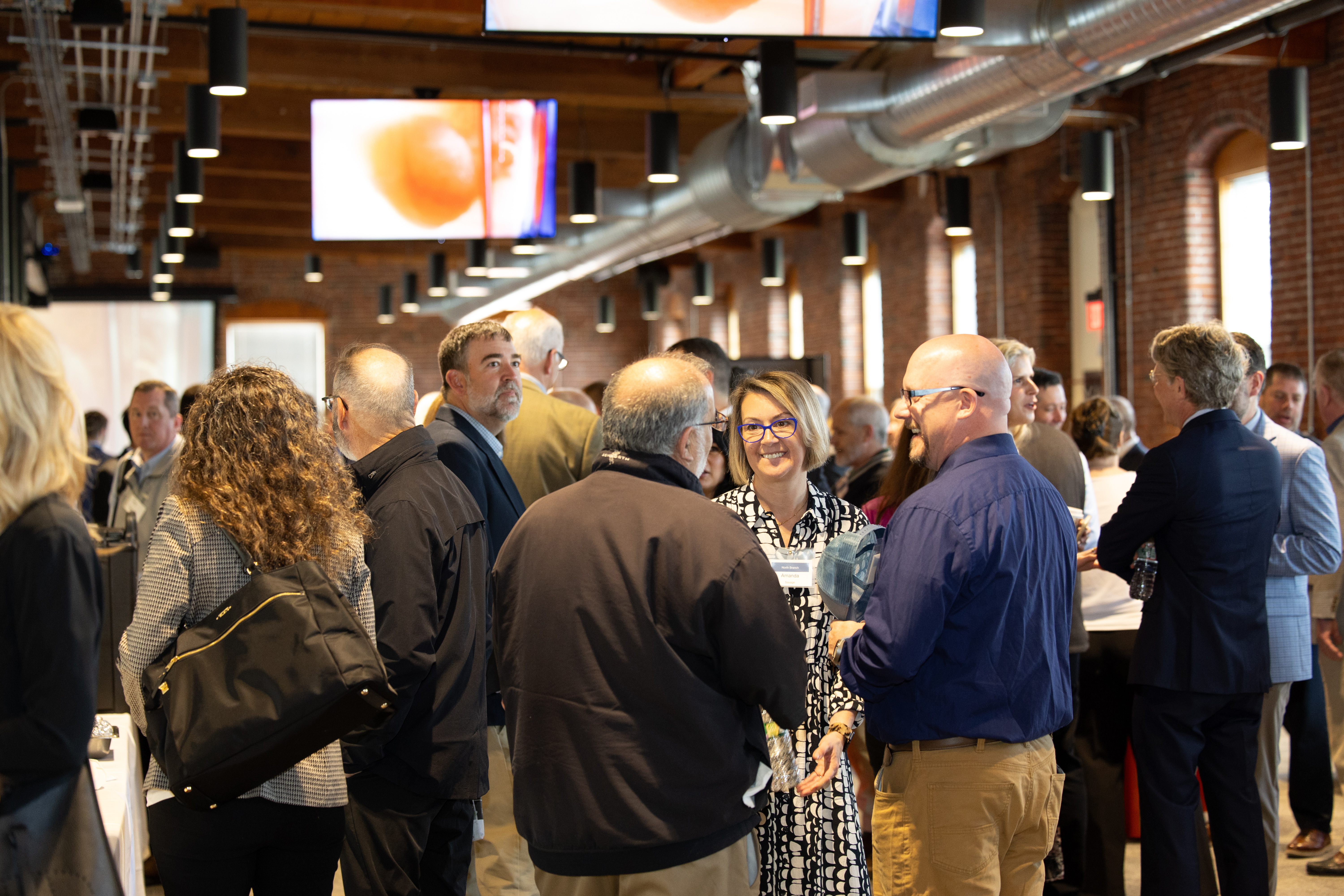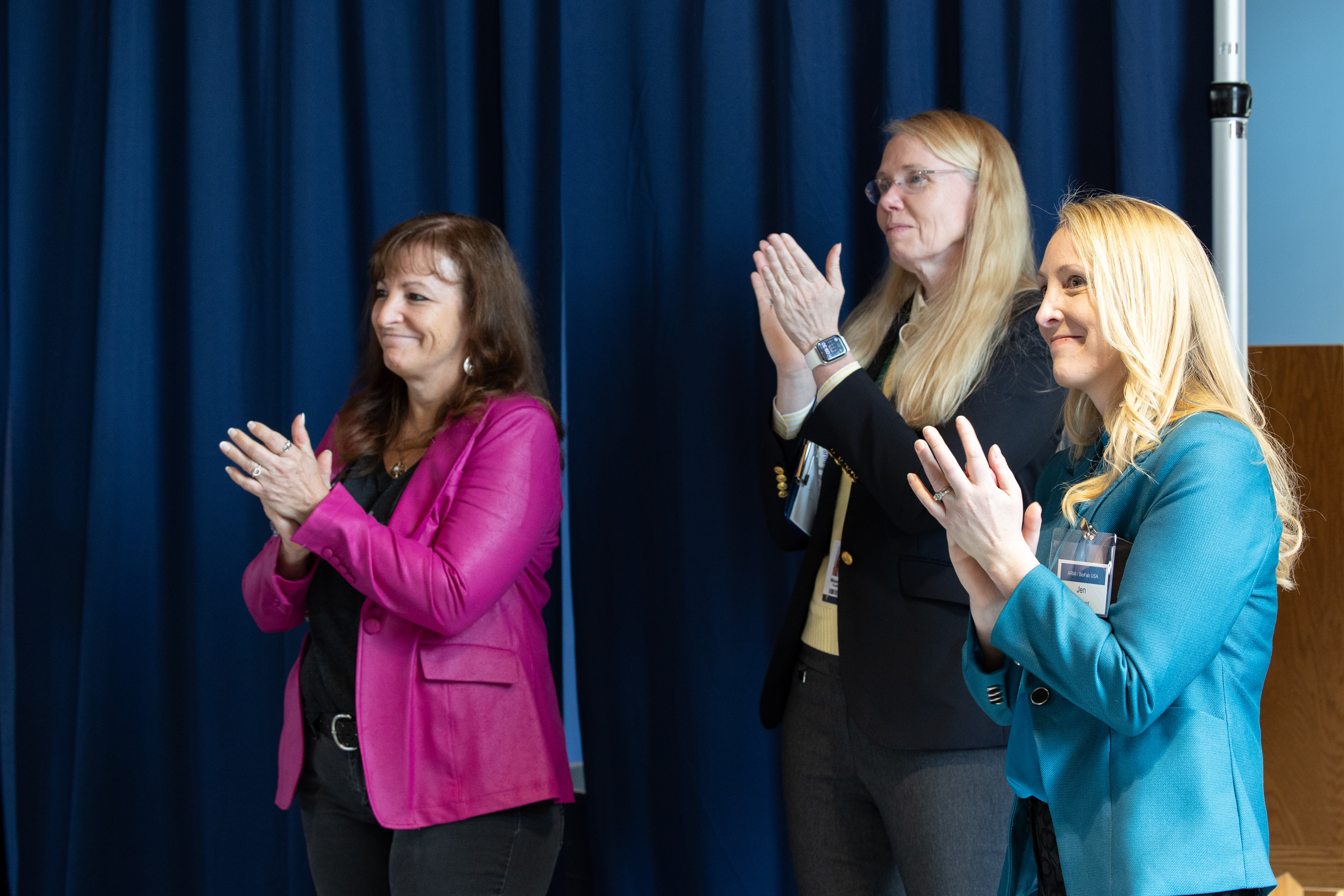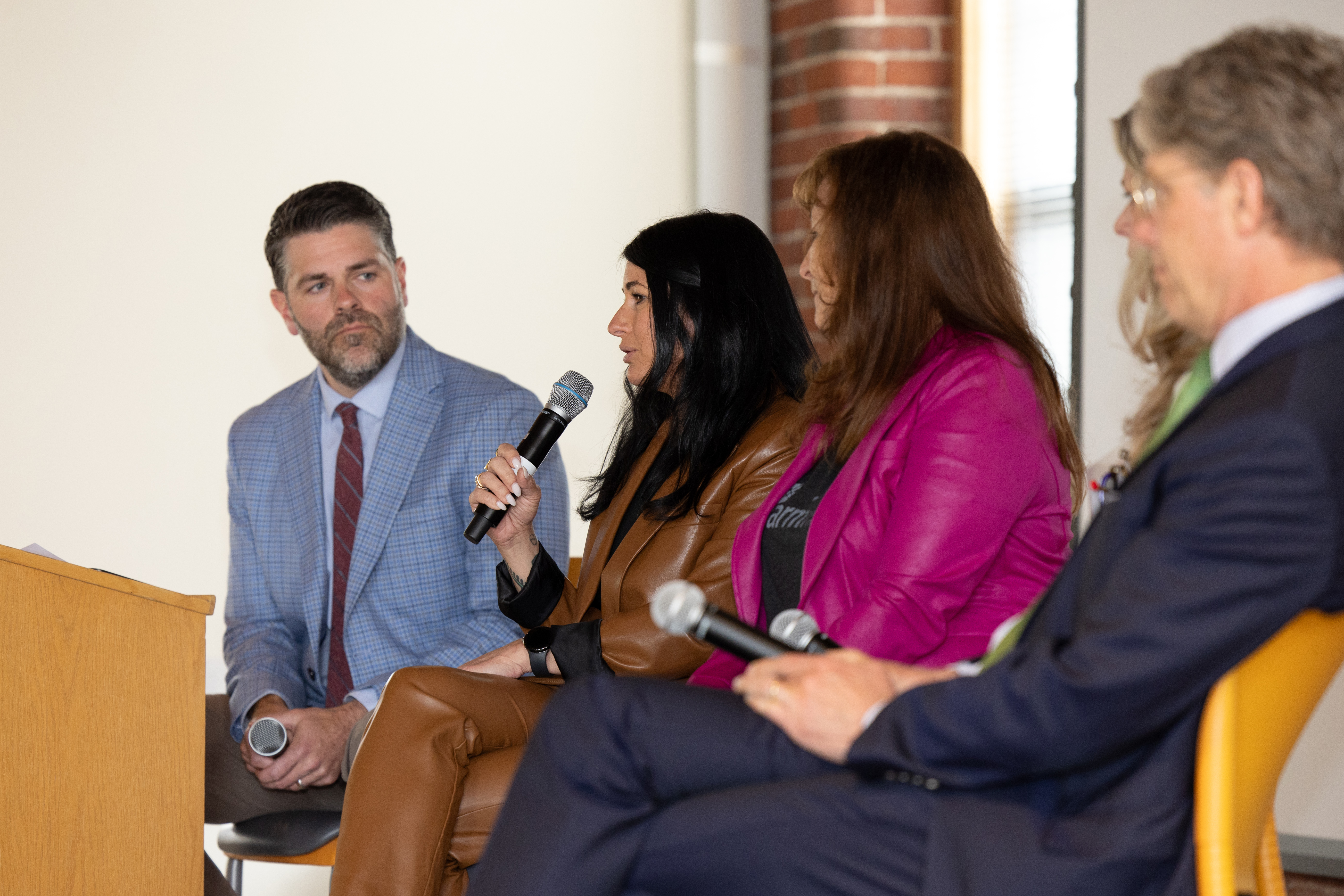A new $100 million commitment from Department of Defense gives biotech effort a bigger boost

About 120 people attended a real estate conference about the Advanced Regenerative Manufacturing Institute on May 8 at DEKA in the Manchester Millyard. (Photo by Kendal Bush/ARMI) The federal government is continuing to place huge bets on the Manchester Millyard’s bid to become the world headquarters for the mass production of human tissue and body parts. Now the city and the surrounding region needs to build the infrastructure to support it.
The Department of Defense (DOD) has committed $100 million over the next 10 years to the Advanced Regenerative Manufacturing Institute. The funding is an extension of the original $80 million secured from the DOD by inventor Dean Kamen in 2017, and comes on the heels of the designation last fall of ARMI as a federal Tech Hub by the U.S. Department of Commerce.
“The important piece is that $50 million over five years has already been committed. And then there are five one-year options for $10 million per year,” said Maureen Toomey, ARMI’s deputy executive director.
Technology emerging from ARMI-associated companies include a regenerative graft for damaged rotator cuffs and a retinal patch to curb macular degeneration, which causes blindness in aging adults.
Kamen alluded to the new funding round during a keynote address May 8 to a group of 120 people from the real estate and construction industry gathered for a conference at Kamen’s DEKA headquarters.
“The feds just announced that ARMI’s getting another $100 million,” Kamen told the group at the event hosted by construction management firm Fulcrum and the New England Real Estate Journal.
The agreement between ARMI and the Defense Department was signed in March, Toomey said. Like the original agreement, it requires a cost-sharing match of funding and in-kind services, which she expects will be dollar for dollar.
The extension builds on additional funding the project has secured since 2017, including $44 million in 2022 from the Economic Development Administration as part of the Build Back Better Regional Challenge. The regional effort, which includes Nashua, has been dubbed “ReGen Valley.”
“The continuation of the DOD funding gives us foundational funding for the continued development of the manufacturing processes and platforms,” Toohey said. “The real estate component, along with the Economic Development Administration and Tech Hub designation, gives us the commercialization and place-based funding that is necessary for the ReGen Valley to become an epicenter for regenerative medicine.”
ReGen Valley is predicted to generate 9,000 jobs over the next several years and thousands more from related industries that will support it. ARMI already has more than 200 member companies scattered around the country.
“We’re in a roomful of people that are worried about real estate. I hope you are good at what you do. I hope you focus on building out enough infrastructure,” Kamen said.
At the heart of the conference — which included a panel discussion featuring representatives from ARMI, state and local government, and the life sciences industry — was the challenge to Manchester and the surrounding region to create the workforce, housing and other infrastructure needed to support an industry that is just beginning to take root and expected to grow quickly in the years ahead.
How can the city and the surrounding communities attract the young workforce ARMI will need to grow the industry?
How can the region create the right mix of housing so that it will both attract new workers and not become too expensive for the people who already live here?
What’s not in question: The race is on. “We now have proven that we are on the precipice of creating an entire new industry,” Kamen said.

Julie Lenzer, chief innovation officer; Maureen Toohey, deputy executive director; and Jennifer MacDonald, chief operating officer, of the Advanced Regenerative Manufacturing Institute, at a May 8 ARMI conference in Manchester. (Photo by Kendal Bush/ARMI)
More workers, more housing
During a roundtable discussion moderated by Mike Skelton, president and CEO of the Business and Industry Association of New Hampshire, the need for housing to attract a young workforce dominated much of the discussion.
Jodie Nazaka, economic development director for the city of Manchester, noted the rise of apartment units downtown, both through the conversion of office buildings and new development. They include new apartment complexes completed or underway east and north of the Market Basket on Elm Street.
“Our city is seeing a surge in major residential development projects in the pipeline. Right now, we have over 1,700 new residential units in various stages of development,” said Nazaka, who noted the uptick began a couple of years ago. “You’ll see some over by Market Basket that are almost ready to come online, and you’ll see some that are just going through our planning board and permitting processes right now.”
That housing is aimed at attracting a young workforce and keeping them here.
“Dean mentioned that we have a young, able-bodied workforce that’s interested in our city, and that’s true,” Nazaka said. “We always hear a lot about an aging state. Here in New Hampshire, we have a median age of 43, but right here in Manchester, our median age is 36. And that’s continuing to drop. Just in 2019, that age was 38.”
Taylor Caswell, commissioner of the New Hampshire Department of Business and Economic Affairs, said new housing options need to range from large apartment complexes to “converting that old Victorian downtown to six or seven units.”
The challenge will be for New Hampshire to create the right mix of housing without diminishing the quality of life that attracts people to the Granite State. That means involvement from local communities.
“This state runs on local control,” Caswell said. “Cities and towns get the final say in how they’re going to do it, but we can create an atmosphere for them to have a rational, thoughtful and deliberate discussion about how that’s going to occur.”

Jodie Nazaka, economic development director for the city of Manchester, talks about the city’s efforts to support the ARMI project during a panel discussion moderated by Mike Skelton, president and CEO of the Business and Industry Association of New Hampshire (left). (Photo by Kendal Bush/ARMI)
Life sciences gaining steam
The success of ARMI is tied to the regional growth of the sciences industry that stretches to the Seacoast, the Monadnock Region and the Upper Valley in New Hampshire and south to Cambridge in Massachusetts.
Andrea Hechavarria, president and CEO of New Hampshire Life Sciences, a newly formed industry trade group, referenced a recent state study that said the life sciences industry in 2021 employed 11,290 workers at more than 600 companies and generated $4.3 billion in annual revenue.
“We’ve got medical device manufacturing, medical equipment, traditional pharmaceutical companies, diagnostics, and there are pockets throughout the state and certainly a ton of attention and focus on Manchester for everything that’s been happening with ARMI,” Hechavarria said.
The life sciences corridor in Massachusetts includes Worcester and Lowell and is expanding to New Hampshire “naturally and organically.” The migration to New Hampshire has accelerated since COVID, she said.
“I don’t think we’ve seen any signs of it slowing. And we’re really embracing and working together, both at an industry level and at a state level, to essentially wave the flag and say, ‘We’re open for business here in the life sciences,’” Hechavarria said.
The growth of ARMI and the biofabrication industry will require the collective efforts from people from multiple disciplines, said Julie Lenzer, ARMI’s chief innovation officer.
“Dean (Kamen) recruited me about two years ago, because he recognizes that we have brilliant scientists and engineers, but creating a business and creating an industry out of that requires some different skills,” Lenzer said. “It requires capital; it requires resources; it requires lawyers; it requires accountants, business folks, entrepreneurs. I was recruited to come in and help start to build that ecosystem.”
Lenzer retold the story of an early ARMI meeting, which involved getting some of those different disciplines to work together.
“We had scientists on one side, and we had engineers on the other side, and never the twain shall meet. And the early team with ARMI started coming and saying, ‘Hey, look, you guys need to talk to each other. We can help each other.’ And there was a little bit of a suspension of disbelief as we started to build out this prototype.”
Lenzer said ARMI’s designation as one of 31 Tech Hubs across the country has not only put the project in line for additional funding but helped galvanize the regional effort.
“What it also did is it brought the community together. It really has been a unifying call,” she said.
ReGen Valley is predicted to generate 9,000 jobs over the next several years and thousands more from related industries.